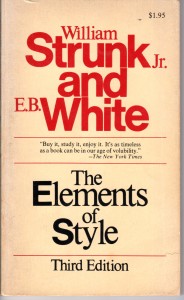 Yelling on Paper
Yelling on Paper
H. L. Mencken referred to a writer as an individual “in whom the normal vanity of all men is so vastly exaggerated that he finds it a sheer impossibility to hold it in. His overpowering impulse is to gyrate before his fellow men, flapping his wings and emitting defiant yells. This being forbidden by the police of all civilized countries, he takes it out by putting his yells on paper.”
Hm. Not sure if Mencken’s thought pattern is running true to course for the majority of writers. But that’s his opinion. He assumes that every writer writes simply to feed his or her vanity.
Reading Our Work
Late in life when E.B. White’s eyes were failing, a friend offered to read to him. When asked what he would like to have read, he chose his own works. Then he said, “I have always been aware that I am by nature self-absorbed and egotistical.”
I remember a few years ago, I embarked on a project of reading through each one of my past published novels. I never even thought about doing it because of my ego. I did it 1) because I wanted to remember… and 2) because I think they’re great stories. If that’s egotistical, then so be it.
But back to the title of this blog post. Why do authors write?
Pay Back Time
Some will admit they write so they can pay back all those people who told them they couldn’t write. Or told them that they would never amount to anything.
John Grisham is one of those. He admitted that in his novels he was getting back at “lawyers, prosecutors, judges, law professors, and politicians. I just line ‘em up and shoot ‘em.”
‘em up and shoot ‘em.”
Many novelists lived the life of the misfit throughout their school years. They were the quiet introvert-type. That station in life pretty much set them up for living the solitary existence of an author. But still and yet, is that the answer to the why question?
Off the Top of My Head
Perhaps I have never dug down deeply enough. Or more probably, I never particularly cared about why I write. But if I were to answer the question off the top of my head – without being philosophical – I would say I write because I love to write. Simple as that. I love to write both my own stuff and to create writing projects for others (freelance writing). There’s nothing I would rather do with my life than to spend most of the hours of every day writing.
Quickly on the heels of that, I would answer the why question by saying “I love stories. I love story telling.”
I derive great satisfaction from plotting, developing, structuring, producing, creating a novel-length story. It feeds my very soul.
Pretty simple; not very deep.
Oh, and “yelling on paper” is not on my list.
What would you say? How would you answer?
~*~*~*~*~*~*~*~*~*~*~*~*~
Coming Fall 2013:
The Norma Jean Lutz Classic Collection
Don’t miss out. Click HERE for updates
This collection includes re-released titles of previously-published teen novels
Don’t miss out. More Details HERE!
~*~*~*~*~*~*~*~*~*~*~*~*~

 Avoiding the Redundancy Trap
Avoiding the Redundancy Trap drawing should have no unnecessary lines and a machine no unnecessary parts. This requires not that the writer make all his sentences short, or that he avoid all detail and treat his subjects only in outline, but that every word tell.”
drawing should have no unnecessary lines and a machine no unnecessary parts. This requires not that the writer make all his sentences short, or that he avoid all detail and treat his subjects only in outline, but that every word tell.”